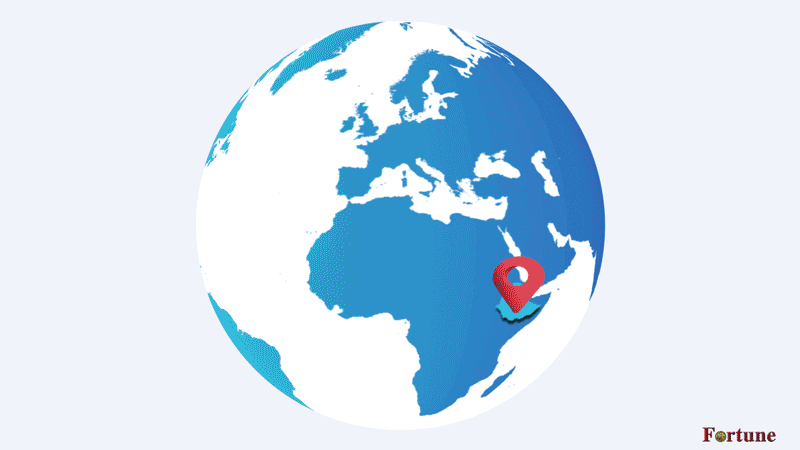
Covid-19 | Apr 04,2020
Feb 17 , 2024
By Colin Coleman
Africa is forecast to be one of the largest sources of global economic growth over the next 50 years. Still, the continent’s demographic dividend could lead to mass migration and the subsequent rise of far-right governments across Europe. The international community must act now to avoid this nightmare scenario, writes Colin Coleman, an adjunct professor at Columbia Business School, in this commentary provided by Project Syndicate (PS).
Africa could be the largest source of global economic growth over the next half-century. But during the same period, the continent could also trigger the next great European war.
Goldman Sachs projects that Africa’s GDP will grow from roughly three trillion dollars today to 44 trillion dollars in 2075, with its share of global GDP rising from three percent to 11pc. This increase would make the continent one of the world’s main growth engines, surpassed only by India, which is predicted to add 46 trillion dollars in GDP over the same period. To put this in perspective, between 2030 and 2075, Goldman Sachs’ model predicts that the Chinese GDP will rise by 8.5 trillion dollars less, and the United States’ GDP by 16.5 trillion dollars less, than Africa’s.
By 2075, Nigeria is forecast to become the world’s fifth-largest economy, with a GDP of 13 trillion dollars, and Egypt the seventh, with a GDP of more than 10 trillion dollars. Meanwhile, Ethiopia is expected to rank 17th, while South Africa remains around 25th, with GDPs of more than six trillion and three trillion dollars, respectively.
At the same time, Africa’s population is set to rise from 1.4 billion today to 3.3 billion in 2075, accounting for 32pc of the world population, up from 18pc today, according to the United Nations’ 2022 "World Population Prospects" report.
Two conclusions can be drawn from all this.
Nearly one-third of the world’s population will have to share 11pc of global GDP by 2075. While this represents an improvement in the current situation, it implies that African countries will still struggle to feed, clothe, and provide income to all their inhabitants, likely triggering an explosion of migration to Europe.
Asmall section of African society will benefit disproportionately from this period of wealth creation, while large segments of the population will most likely remain in poverty, implying a rise in inequality and an increasing risk of social unrest.
To be sure, Africa’s demographic dividend represents an immense opportunity for investors, especially in technology, consumer, clean-energy, agriculture, infrastructure, and fintech industries. But the risk of a humanitarian disaster grows with each passing day, as more people contend with poverty, joblessness, and violent conflict. The continent is a ticking time bomb. Global post-pandemic economic conditions, including the rising cost of capital, surging inflation, and interest-rate hikes, have hit African countries hard, closing capital markets to most African issuers.
The defaults of Zambia, Ghana, and, most recently, Ethiopia are warning signs of a sovereign debt crisis, offset by Côte d’Ivoire’s successful bond issue in January and Kenya's recent, albeit expensive, bond issue. Equally worrying are spiking yields and the wall of debt coming due in countries like Kenya and Angola. As a result, these countries have been forced to cut public spending to the bone and raise taxes, worsening social and business conditions.
Exchange-rate fluctuations, which contributed to the dramatic collapse of Nigeria’s Naira, have tightened financial conditions, reduced the supply of dollars, and made it difficult for corporates to service foreign-currency debts and repatriate their dollar revenues. As humanitarian and sovereign debt crises build and business conditions deteriorate, multiparty democracy on the continent has begun to break down, reflected in the recent string of military coups in West and Central Africa.
The current situation has already fueled a sharp rise in migration. Last September, the UN High Commissioner for Refugees reported that more than 2,500 people had died or gone missing while trying to cross the Mediterranean to Europe in the first nine months of 2023, with many more perishing before they reached the coast. During that same period, 130,000 migrants, many departing from Tunisia or Libya, landed in Italy.
These numbers will increase sharply if Africa’s population growth is not coupled with improving economic conditions. Worryingly, the International Monetary Fund’s (IMF) current forecasts suggest GDP growth of around four percent in Sub-Saharan Africa for the next two years – well below long-term trends. The current influx of mass migration to European countries such as Italy, Spain, and Greece may be only the beginning.
The impact of African migration on European countries’ domestic politics can already be seen in the increasing popularity of right-wing, anti-immigration parties across the continent. The political tremors that massive African migration would trigger throughout Europe in the coming decades could even lead to the rise of fascism. To avert this nightmare scenario, policymakers must act now.
Sending asylum-seekers back to the continent – as envisioned by the United Kingdom’s controversial deportation deal with Rwanda – won’t stop migration (and, importantly, does not comply with human rights standards). The only answer is to fix the structural problems that plague Africa. That means supporting various homegrown African initiatives, including the Africa Continental Free Trade Agreement (ACFTA), innovative infrastructure-financing tools, and peace and security missions.
The international community should consider implementing a comprehensive Marshall Plan for Africa, led by the G20. By mobilising large-scale financing, boosting trade, investing in capacity-building initiatives, and providing military and security support, the G20 could collaborate with the African Union (AU) and leading African countries to accelerate economic growth, promote human development, and ensure social stability on the continent.
For such a plan to work, the United States, European countries, and China must come together to design, negotiate, and implement this initiative. A joint effort is needed to deliver structural transformation, as the best intentions of individual countries will not be enough to tackle Africa’s economic, social, and political problems. Failing that, the continent’s problems will eventually ignite a global conflagration that burns brightest in Europe.
A G20-led Marshall Plan for Africa could help produce sustainable solutions to the continent’s biggest challenges. When combined with homegrown initiatives and the nearly one trillion dollars annual GDP growth that Goldman Sachs forecasts, it could provide the incentive required to mobilize the massive private-sector investment the continent needs.
PUBLISHED ON
Feb 17,2024 [ VOL
24 , NO
1242]


Covid-19 | Apr 04,2020

Fortune News | Feb 11,2023

Advertorials | Sep 13,2021

Viewpoints | Jun 14,2025

Viewpoints | May 31,2025

Commentaries | Oct 24,2020

Radar | May 27,2023

Fortune News | Feb 18,2024

Covid-19 | Apr 08,2020

View From Arada | Apr 20,2025

My Opinion | 131974 Views | Aug 14,2021

My Opinion | 128363 Views | Aug 21,2021

My Opinion | 126301 Views | Sep 10,2021

My Opinion | 123917 Views | Aug 07,2021

Dec 22 , 2024 . By TIZITA SHEWAFERAW
Charged with transforming colossal state-owned enterprises into modern and competitiv...

Aug 18 , 2024 . By AKSAH ITALO
Although predictable Yonas Zerihun's job in the ride-hailing service is not immune to...

Jul 28 , 2024 . By TIZITA SHEWAFERAW
Unhabitual, perhaps too many, Samuel Gebreyohannes, 38, used to occasionally enjoy a couple of beers at breakfast. However, he recently swit...

Jul 13 , 2024 . By AKSAH ITALO
Investors who rely on tractors, trucks, and field vehicles for commuting, transporting commodities, and f...

Jul 5 , 2025
Six years ago, Ethiopia was the darling of international liberal commentators. A year...

Jun 28 , 2025
Meseret Damtie, the assertive auditor general, has never been shy about naming names...

Jun 21 , 2025
A well-worn adage says, “Budget is not destiny, but it is direction.” Examining t...

Jun 14 , 2025
Yet again, the Horn of Africa is bracing for trouble. A region already frayed by wars...

Jul 6 , 2025 . By BEZAWIT HULUAGER
The federal legislature gave Prime Minister Abiy Ahmed (PhD) what he wanted: a 1.9 tr...

Jul 6 , 2025 . By YITBAREK GETACHEW
In a city rising skyward at breakneck speed, a reckoning has arrived. Authorities in...

Jul 6 , 2025 . By NAHOM AYELE
A landmark directive from the Ministry of Finance signals a paradigm shift in the cou...

Jul 6 , 2025 . By NAHOM AYELE
Awash Bank has announced plans to establish a dedicated investment banking subsidiary...